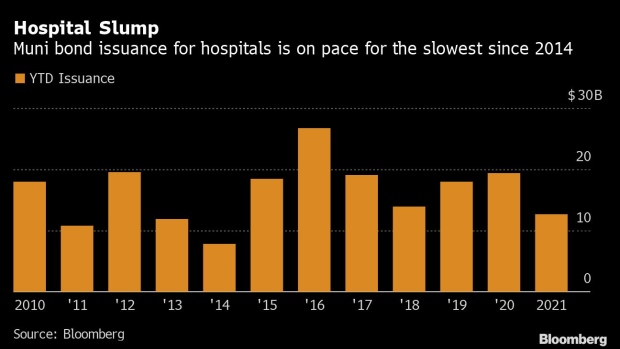Sep 23, 2021
Hospital Muni-Bond Issuance on Track for Slowest Year Since 2014
, Bloomberg News

(Bloomberg) -- U.S. hospitals are pulling back on issuing municipal debt in the midst of the ongoing Covid-19 pandemic, following a wave of federal aid that softened borrowing needs and uncertainty that has clouded capital spending plans.
Muni-bond sales by U.S. hospitals have fallen about 34% to $12.6 billion this year compared to the same period in 2020. The borrowings are on pace to be the lowest since 2014, according to data compiled by Bloomberg.
The slowdown in such debt sales may reflect a slump in planned capital expenditures given the uncertainty surrounding the pandemic, said Ryan Ciavarelli, senior research analyst for Belle Haven Investments. “You don’t see a lot of hospitals issuing new money debt to build a new hospital unless they had those plans in the works,” he said.
Taxable health-care issuance, on the other hand, is roughly on track for an average year, likely because many hospital systems are refinancing tax-exempt debt with longer calls and terming out lines of credit tapped during the early stages of the pandemic, Ciavarelli said.
Another factor driving the decline may be the presidential election in 2020, which spurred borrowers to move deals forward that year to avoid potential market disruption in the aftermath of the vote, said Steve Sohn, senior vice president at health-care consultancy Kaufman Hall & Associates LLC.
Hospitals generally performed better in 2020 than many investors expected after elective surgeries, which had been deferred during the peak of the virus, recovered and an influx of federal aid strengthened balance sheets. Many systems are now better equipped to handle Covid-19 case surges while still continuing to provide elective procedures, a major driver of revenue.
The Bloomberg Hospital index has returned 2.72% year to date, the strongest performance among municipal revenue bond sectors tracked by Bloomberg. The high-yield hospital bond index returned 6.67% over the same period.
Under the CARES Act passed in March 2020, the U.S. Department of Health and Human Services received $175 billion to distribute to hospitals and health-care providers. The American Rescue Plan Act also secured additional aid for providers.
“The need to come to market isn’t quite so great with the federal stimulus money being allocated,” said Kim Olsan, senior vice president for municipal trading at FHN Financial. “As states have found with G.O. debt, airports, transit systems, a lot of that federal money is taking the place of traditional financing needs.”
Still, the outlook for the sector is complex. Covid-19 cases and hospitalizations spiked in recent weeks as delta spread, reaching a seven-day moving average of nearly 160,000 cases earlier this month. Kaufman Hall projects hospitals nationwide will lose an estimated $54 billion in net income over the course of 2021, even considering federal relief from the CARES Act. More than a third of U.S. hospitals will maintain negative operating margin through year end, according to a September report from Kaufman Hall.
Like other businesses and governments, staffing is also a concern that is prompting some hospitals to look into closing service lines, cross-training nurses and offering signing bonuses to new hires, which could compress margins.
“Pretty much every single major health care system is having challenges with labor, especially on the nursing side,” Kaufman Hall’s Sohn said.
©2021 Bloomberg L.P.